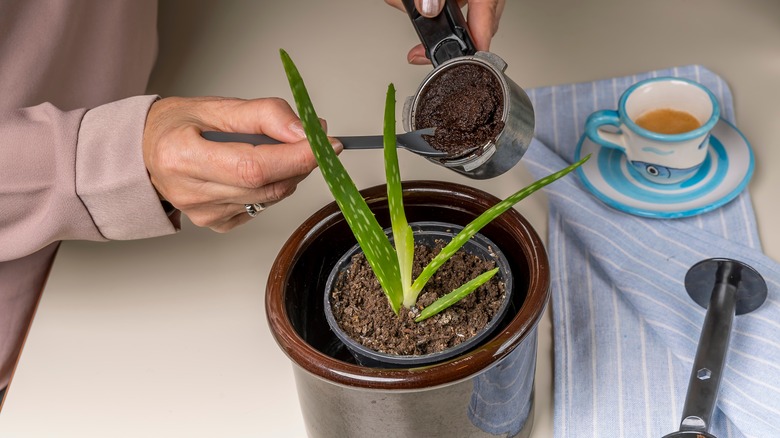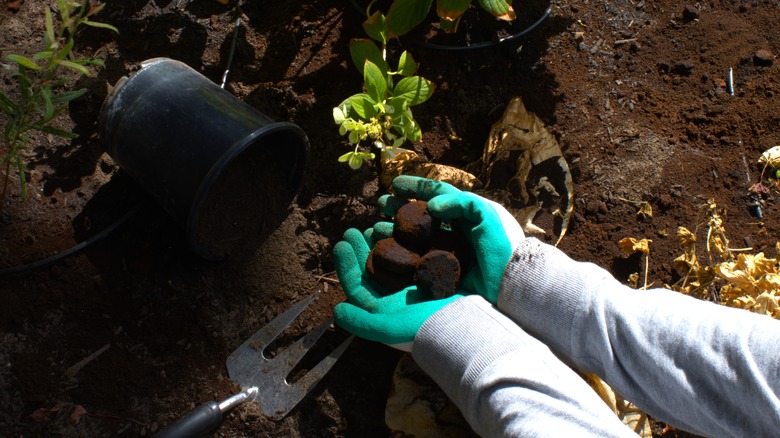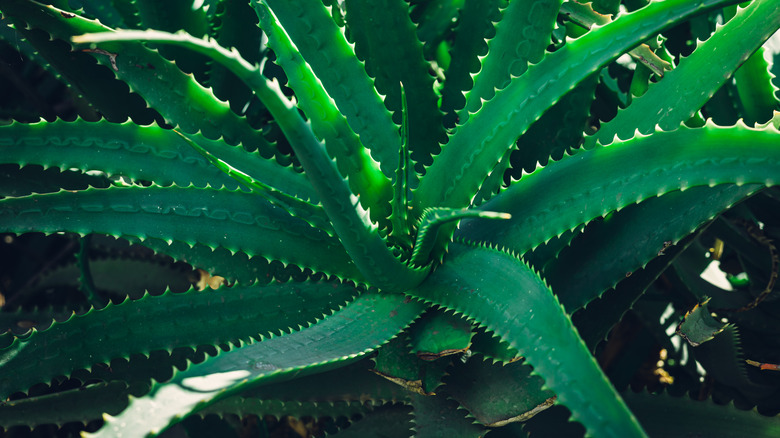Will Coffee Grounds Help Aloe Vera Plants Grow Or Just Make Things Worse
Aloe's luscious thick leaves look lovely while they grow — but if your plant is unhealthy, the sad succulent is an easy-to-spot advertisement for its unfortunate state. Droopy, discolored leaves might remind you of how you feel first thing in the morning. Could some coffee grounds perk it up, just like the drink does for you? Online houseplant enthusiasts disagree: Some plants appeared robust after being treated with coffee grounds, while others suffered fatal effects.
There isn't a lot of solid data out there to back up whether used java grounds are good, bad, or do nothing at all for aloe plants. There are a slew of plants in your home and garden that don't like coffee grounds as fertilizer, while there are other plants you can give coffee grounds to help them thrive. So is it worth a try to sprinkle some spent grounds on your potted or garden-dwelling aloe? How do coffee grounds benefit other plants, and how are grounds best applied?
Coffee grounds are not as good of a nutrient supplement as people might think. They provide a bit of nitrogen, but as they break down, the nitrogen goes to microorganisms in the soil. According to Linda Brewer, a soil scientist at the Oregon State University Extension, coffee grounds aren't a reliable source of nutrients on their own. However, used in moderation, the grounds can boost soil quality by giving its microscopic residents a good meal.
What does aloe need to grow successfully?
The perks of adding coffee grounds to aloe plants include repelling pests and improving soil quality. Snails can be a problem for outdoor aloes; used coffee grounds have been effective snail repellent on orchids in studies, possibly making it a solution for your aloes, as well. Even though the nitrogen given off by coffee grounds doesn't go directly to the plant, the soil microbes using that nitrogen produce a substance that improves drainage and strengthens soil structure.
There appear to be more possible disadvantages than advantages to adding used coffee grounds to your aloe plants' soil, however. Coffee grounds' moisture-retaining quality may bring more water to the party than aloes can handle. The plant also has a limited appetite for fertilizer, meaning your morning leftovers may be better off in the compost bin than mixed into your aloe's soil.
There are issues with using coffee grounds on other plants as well. The small amounts of caffeine left over in used grounds can slow growth in certain plants. When used as a mulch, fine coffee grounds can compact into a barrier that cuts down on air and moisture flow. You might feel like there's no such thing as "too much coffee" when it comes to refilling your mug, but there is certainly a limit for plants. Moderation is key: To avoid harmful effects, try mixing ½ inch of used grounds into the top 4 inches of soil.
Fertilizing aloe for successful growth
Native to Africa, aloe vera is desert-tough and has a short list of needs when it comes to optimal growth. As for how to grow and take care of aloe vera plants, little more than sun, warmth, occasional watering, and infrequent fertilization should keep your potted friend happy and healthy. Make sure to avoid direct sunlight as this can stress the plant, leading the yellowing and drying out.
The University of California Davis advises giving a small amount of balanced fertilizer to your aloe both in the mid-spring and late summer if your aloe lives in a pot or outdoors in sandy soil. Try a balanced liquid fertilizer or slow-release pellets. Yet, the South Dakota State University Extension doesn't advise giving your aloes any fertilizer. Instead of taking a chance on coffee as a fertilizer for your aloe, stick with a small amount of standard indoor plant fertilizer or, frankly, none at all.


